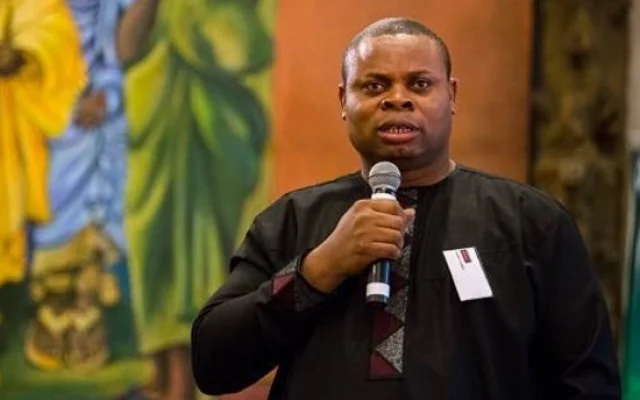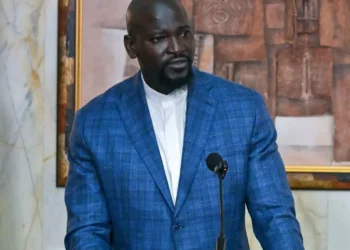The President of policy think tank IMANI Africa, Franklin Cudjoe, has sharply criticised the politicisation of nurse incentives, calling it a shortsighted strategy that undermines the sustainability of Ghana’s healthcare systems.
Speaking in the wake of the Ghana Registered Nurses and Midwives Association (GRNMA) strike, which brought significant disruption to health services nationwide, Cudjoe said successive governments have turned critical sectors into “political footballs” instead of making long-term investments in workforce development.
Cudjoe asked rhetorically, “How have we treated nurses even when they are training—we’ve pampered them. Haven’t we?” referencing past decisions to restore or scrap trainee allowances for electoral advantage.
According to him, the political pendulum swing between removing and restoring the allowances has distorted policy priorities, focusing on short-term appeasement rather than investing in quality healthcare delivery and fair compensation for practicing professionals.
“Politically, one party says—John Mahama—that he is not going to pay any nurses allowance. The opposition at the time used it against him. And when they came, they started paying and rewarding these entities. I have never understood that game.”
Franklin Cudjoe, President of policy think tank IMANI Africa

Franklin Cudjoe’s comments were sparked by the June 9–13 strike by GRNMA, which saw nurses and midwives across the country withdrawing services to protest the government’s proposed delay in implementing newly agreed conditions of service until 2026.
While the strike has now been suspended following government reassurances, Cudjoe warned that such crises stem from decades of populist policies.
“The moment we do these shifty politics and think we can garner votes through these freebies to a section of the population that do not require it, we should not be crying now that they have come back biting at us.”
Franklin Cudjoe, President of policy think tank IMANI Africa
He questioned why Ghana continues to reward trainees instead of investing in infrastructure, fair wages, and continuous professional development for qualified professionals who are already serving in difficult conditions.
Cudjoe asked, “Why not direct those funds to those who actually go through the grind and contribute meaningfully to our healthcare sector?” adding that both major political parties are guilty of manipulating public funds for electoral gain.
Cost of Politicised Policymaking

Analysts say the standoff and the surrounding debate expose the fragility of policy planning in Ghana’s public service sector.
“When populist gestures replace strategic planning, we end up with systemic imbalances.
“You have a sector bloated with expectations, but underfunded in operations. Eventually, something gives.”
Franklin Cudjoe, President of policy think tank IMANI Africa
Franklin Cudjoe further warned that future governments must avoid the temptation of treating critical sectors like healthcare and education as “vote banks.”
He called for a bipartisan agreement to shift focus away from allowances and direct spending toward equipping institutions, training qualified personnel, and retaining skilled professionals with competitive remuneration and working conditions.
The recent strike by the GRNMA exposed vulnerabilities in Ghana’s public health infrastructure, with emergency and maternity services being hit hardest. Many hospitals and clinics were forced to scale down operations or rely heavily on skeleton staff.
The standoff was triggered by the government’s communication that it intended to delay the rollout of updated compensation packages, which had been agreed upon after months of negotiation. GRNMA described the delay as a breach of trust, prompting thousands of nurses to abandon their posts.

The Ministry of Health and the Fair Wages and Salaries Commission were heavily criticised for poor communication and planning. Public pressure and media coverage forced both parties back to the negotiation table.
On June 13, GRNMA announced the suspension of the strike, citing new commitments from the government to revisit the proposed timeline.
Cudjoe’s intervention adds a compelling voice to the ongoing discourse about the efficiency of public sector spending. While political support is critical to maintaining voter engagement, using allowances as political leverage distorts priorities and weakens sectoral resilience.
If Ghana is serious about its ambitions of achieving universal healthcare coverage and improved learning outcomes, policymakers must recalibrate spending patterns toward performance-based incentives, infrastructure investment, and professional retention.
What the GRNMA strike has revealed is not merely a labour dispute, but a reflection of underlying systemic neglect. It is time Ghana abandoned electoral expediency in favour of sustainable sectoral reform.
READ ALSO: Ghana’s Economy Beats 2024 Figures with 5.3% Growth in Q1 2025



















